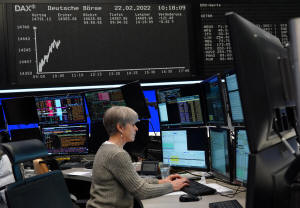Stocks slide on stalled U.S. debt talks and inflation woes
 Send a link to a friend
Send a link to a friend
 [May 24, 2023] By
Lawrence White [May 24, 2023] By
Lawrence White
LONDON (Reuters) - Stocks lurched downwards on Wednesday as U.S. debt
ceiling negotiations dragged on without resolution, stoking a general
malaise in markets that saw safe haven assets like the dollar and gold
hold around recent highs.
The New Zealand dollar meanwhile tumbled after the central bank caught
markets off-guard by flagging that its tightening cycle is over.
Europe's benchmark STOXX index fell 1.7% to a 3-week low in early
trading, as a jump in UK core inflation and more losses in market-heavy
luxury names hurt risk sentiment. MSCI's broadest index of Asia-Pacific
shares fell 0.8%.
UK homebuilders led declines on the FTSE 100 after data showed a closely
watched core measure of UK price growth surged to a 31-year high in
April, cementing bets of more interest rate hikes from the Bank of
England.
Europe's luxury stocks fell nearly 2% to a seven-week low as a selloff
in the sector continued.
Crude oil prices kept rising, though, after a warning from the Saudi
energy minister to speculators that raised the prospect of further OPEC+
output cuts.
The New Zealand dollar dropped as much as 1.3% after the Reserve Bank
wrong-footed markets by keeping its forecast for the terminal rate at
5.5%, after hiking by a quarter point to that level.
"It's an indication that the tightening cycle is over," said Jason Wong,
a strategist at Bank of New Zealand. "No one was really expecting that."

Market pricing had favoured a half-point hike, and traders were also
primed for an extension of the tightening streak.
DEBT CEILING DOLDRUMS
U.S. equity futures suggested Wall Street would inherit the sour market
mood from Europe, with S&P 500 and Nasdaq futures down around 0.3%.
Representatives of President Joe Biden and congressional Republicans
ended another round of debt ceiling talks on Tuesday with no signs of
progress.
Treasury Secretary Janet Yellen has warned that the federal government
could no longer have enough money to pay all its bills as soon as June
1, raising the risk of a damaging default.
While the risk of a default that could precipitate a recession is bad
for the United States, investors worried about the repercussions for the
global economy have turned away from riskier assets.
[to top of second column] |

A trader works at the Frankfurt stock
exchange in Frankfurt, Germany, February 22, 2022. REUTERS/Timm
Reichert

Reports that Treasury has asked federal agencies whether they can
delay upcoming payments added to the sense of crisis.
"Payment prioritisation is now real," Chris Weston, head of research
at brokerage Pepperstone in Melbourne, wrote in a client note.
"And while it seems highly prudent to have this conversation, the
market's anxiety levels have heated up consequently," he said. "The
market is starting to de-risk."
The U.S. dollar index, which measures the currency against six major
peers, rose 0.17% to 103.7, nudging further above a two-month high
of 103.63 reached last week.
BRITAIN: INFLATION NATION
Euro zone bond yields rose after British inflation data came in
stronger than expected, a reminder to investors that the global
fight against price rises is far from over.
Germany's 10-year bond yield, the benchmark for the euro zone,
climbed to a one-month high of 2.501% before paring its rise
slightly. The 10-year U.S. Treasury yield was little changed at
3.68%. Yields move inversely to prices.
In commodities, gold traded in a narrow range around$1,977 as
traders eyed debt ceiling talks and the possibility of further
central bank hikes.
Interest rate hikes raise the opportunity cost of holding
non-interest-bearing gold.
Crude oil price extended gains from Tuesday, when Saudi Energy
Minister Prince Abdulaziz bin Salman warned speculators to "watch
out," saying "they will be ouching."
Brent crude futures rose more than a dollar to $77.95 a barrel,
while U.S. West Texas Intermediate crude (WTI) likewise rose $1.16
to $74.06 a barrel.
(Reporting by Lawrence White and Kevin Buckland; Additional
reporting by Tom Westbrook and Harry Robertson; Editing by Simon
Cameron-Moore, Christina Fincher and Chizu Nomiyama)
[© 2023 Thomson Reuters. All rights
reserved.]
This material may not be published,
broadcast, rewritten or redistributed.
Thompson Reuters is solely responsible for this content.
 |